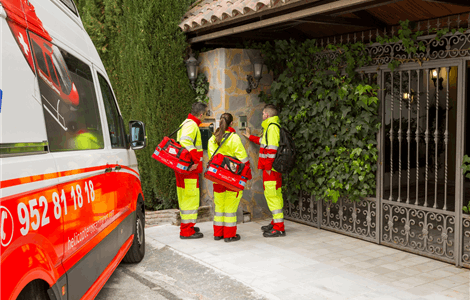
Everyone should make their homes as safe as possible, but this is especially important if you are caring for someone who has Alzheimer's disease or another form of dementia that is related to it. Consider these home safety tips for caregivers, as well as when to call our Home doctor for people with Alzheimer's in Costa del Sol, so that you can avoid stressful and potentially dangerous situations.
Assessing the safety of the home
Consider first the mannerisms, capabilities, and state of health of the person who has dementia. Is it safe for the person to use the stairs? During the night, does he or she move around or get up? Has he or she ever been injured in a fall?
After that, examine every space to look for potential dangers, and make a mental note of any modifications you'd like to implement. It is important to keep in mind that altering the environment, rather than the behaviour of the individual, is likely to produce the desired results. As the disease progresses, it is necessary to conduct periodic reevaluations of any changes in abilities.
Hints for a Safer Bathroom
In the bathroom:
- Install a seat in the shower as well as grab bars. Install grab bars by the toilet, tub, and shower. A handheld showerhead may be helpful.
- Remove slick surfaces. Bathtub and shower need non skid strips or a mat. Place non skid strips near the tub, shower, toilet, and sink unless the bathroom is carpeted.
- Use a faucet cover in the bathtub. If a person with dementia falls in the bathtub, a foam rubber faucet cover can prevent serious injury.
- Lock up dangerous items or appliances. Install childproof latches to limit access to dangerous items. Use child-resistant caps on medications.
- Reduce water temperature. Set your water heater's thermostat below 48.9 C.
- Remove door locks. Remove locks from bathroom doors to prevent accidents.
Kitchen precautions and safety advice
In the kitchen:
- Ensure that access to potentially hazardous appliances is restricted. Install safety knobs on the stove to prevent the person with dementia from turning it on or off.
- Take away any fake fruits or vegetables, as well as any magnets in the shape of food. These may look edible.
- Secure breakable or dangerous items. Childproof cabinets and drawers limit access to cleaning products, alcohol, matches, knives, scissors, and plastic bags.
Bedroom safety tips
In the bedroom:
- Put in a monitoring system. A baby monitor can tell if the person with dementia needs help. This may help with advanced dementia.
- Use heating devices carefully. Don't use portable heaters in the room. Put electric blanket and heating pad controls out of reach.
If the person with dementia gets up at night to drink, eat, or use the bathroom, meet these needs before bed.
Advice for ensuring a secure living room
In the main living areas:
- Unclutter. Remove furniture and cords from walkways. Keep plastic bags away. Limit decor.
- Mark glass windows, doors, and furniture. Put a decal at eye level on glass to help someone see.
- Use fireplaces safely. Don't leave the person with dementia alone with a fire.
Outside safety advice
To ensure safety outdoors:
- Examine the exits. Make sure that the person with dementia, if they use a walker or wheelchair, will be able to enter and exit your home when it is necessary to do so.
- Safeguard stairs. Tape the edges of steps. Keep steps sturdy and textured in wet or icy weather.
- Limit pool access. Fence your pool or hot tub. Lock a gate. Cover unused pools or hot tubs.
- Unclutter. Keep hoses, foliage, and debris off walkways.
- Save fuel. When not in use, remove grill fuel.
Other precautions
In addition, it is important to think about implementing the following preventative measures throughout your home:
- Prepare for emergencies. Put emergency numbers and your address near all phones.
- Install nightlights. Install night lights in the person's bedroom and bathroom to prevent tripping.
- Fix slick or uneven surfaces.
- Change phone and voicemail settings. Set up voicemail and home phone. Lower your home phone's ringer to avoid distractions. Set the answering machine to activate after the fewest rings. A person with dementia may be unable to take messages.
- Protect stairwells. Install light switches at stair tops and bottoms. Ensure stairs have a handrail that extends past the first and last steps.
- Add smoke and CO detectors.
- Verify locks.
- Address outlets and electrical cords. Place lamps close to electrical outlets. Cover unused electrical outlets with childproof plugs.
- Hide computer equipment.
Home doctor for people with Alzheimer's in Costa del Sol
It only takes one phone call to reach our home doctor for people with Alzheimer's in Costa del Sol, and our prompt and professional medical attention can assist with any accident that may take place at the patient's residence. Our members do not hesitate to get in touch with us whenever the need arises, regardless of how inconsequential the circumstance may be. For further information regarding our membership, please contact us right away at the number (+34) 952 81 67 67.